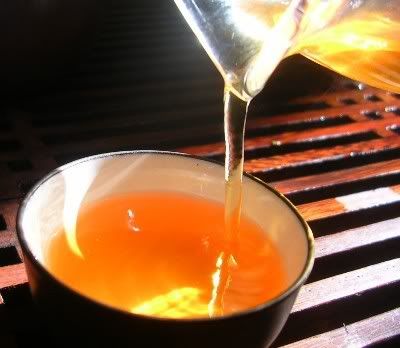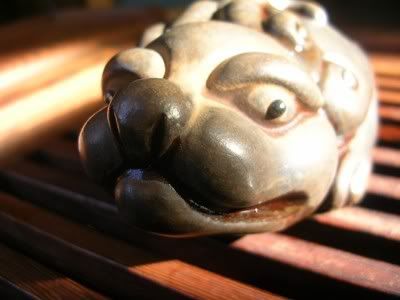It's usually frowned upon to write about Zen. So here goes.
Asking a Zen master a theoretical question about Zen is often met with a direct response. Neither a refusal to answer the question, nor an answer in itself, the response is meant to shake the questioner out of their limited understanding, into the "here and now". One of those with which I most closely identify is Master Joshu's response,
Asking a Zen master a theoretical question about Zen is often met with a direct response. Neither a refusal to answer the question, nor an answer in itself, the response is meant to shake the questioner out of their limited understanding, into the "here and now". One of those with which I most closely identify is Master Joshu's response,
Drink some tea.
Every now and again, I read an article about tea in which the author muses, "Aren't we thinking a bit too much about tea? Being a bit too critical?" I recall something similar in the ever-excellent Tea Logic, MarshalN, and Rec.Food.Drink.Tea sites, for example. Maybe most of us that count drinking tea as a hobby have asked ourselves the same question.
It's a healthy question to ask, and I'd like to have a crack at addressing it from a Zen viewpoint, with the aid of Joshu's "Drink some tea."
It's a healthy question to ask, and I'd like to have a crack at addressing it from a Zen viewpoint, with the aid of Joshu's "Drink some tea."

One of the tenets of Zen (sorry!) is to try and perceive things "as they are". It's not very easy - Zen folk will tell you it's the hardest thing. Enjoying tea is a great way to practice this, and asking yourself, "Am I thinking a bit too much?" is a good way to begin.
Sometimes, like this morning, I sit down with a new tea. I've got lots of questions in my mind: I want to determine its character, perhaps I want to verify the various claims made by the vendor, perhaps I want to decide if it's worth a certain amount of money. Before the tea is even out of the pot, I have a whole headful of assumptions.
This happened today. It wasn't until the third infusion that I realised I wasn't really present - I was somewhere else, wondering about leaf regions, growing conditions, and all of the usual paraphernalia. I looked down at the page in my diary, and saw that I had made some observations about huigan, texture, aroma, and so on - but I hadn't really enjoyed the tea. In fact, I couldn't really recall what the tea was like. Wasn't my purpose to enjoy the tea?
I sat back on my cushion (I'm a floor-squatting type), and told myself, "Drink some tea." I stopped my ponderings, and simply enjoyed the little steaming cup in front of me. It was a new Xizihao, and enjoyment wasn't very difficult - after I had put away my questions, and my goals.
A second relevant Zen tenet (sorry again!) is mushotoku - having no goal. I have a friend who just can't stop trying hard to have fun. He tries so hard to have fun, that in the end he doesn't really have fun at all - and he's quite unhappy about it. Drinking tea was like this for me, this morning. I had so many goals, so much that I wanted to get out of that little cup, that I ended up getting nothing out of it. Until I stopped trying to get things out of it, that is, and then I got a lot out of it.
There's a great deal to be said for providing a good analysis of a tea. A solid critique is very useful, and it's one of the main purposes I maintain these articles, of course. However, this morning I resolved not to let that get in the way of "Drink some tea." I always find my most perceptive notes arise when I stop explicitly trying to analyse, and just drink from the cup with an open mind.
So, it's good Zen practice, but really - it makes for better notes, and better tea.
Sometimes, like this morning, I sit down with a new tea. I've got lots of questions in my mind: I want to determine its character, perhaps I want to verify the various claims made by the vendor, perhaps I want to decide if it's worth a certain amount of money. Before the tea is even out of the pot, I have a whole headful of assumptions.
This happened today. It wasn't until the third infusion that I realised I wasn't really present - I was somewhere else, wondering about leaf regions, growing conditions, and all of the usual paraphernalia. I looked down at the page in my diary, and saw that I had made some observations about huigan, texture, aroma, and so on - but I hadn't really enjoyed the tea. In fact, I couldn't really recall what the tea was like. Wasn't my purpose to enjoy the tea?
I sat back on my cushion (I'm a floor-squatting type), and told myself, "Drink some tea." I stopped my ponderings, and simply enjoyed the little steaming cup in front of me. It was a new Xizihao, and enjoyment wasn't very difficult - after I had put away my questions, and my goals.
A second relevant Zen tenet (sorry again!) is mushotoku - having no goal. I have a friend who just can't stop trying hard to have fun. He tries so hard to have fun, that in the end he doesn't really have fun at all - and he's quite unhappy about it. Drinking tea was like this for me, this morning. I had so many goals, so much that I wanted to get out of that little cup, that I ended up getting nothing out of it. Until I stopped trying to get things out of it, that is, and then I got a lot out of it.
There's a great deal to be said for providing a good analysis of a tea. A solid critique is very useful, and it's one of the main purposes I maintain these articles, of course. However, this morning I resolved not to let that get in the way of "Drink some tea." I always find my most perceptive notes arise when I stop explicitly trying to analyse, and just drink from the cup with an open mind.
So, it's good Zen practice, but really - it makes for better notes, and better tea.


As a "tea maniac" as well as a instructor in "chanoyu" I am very impressed by your thoughts...
ReplyDeleteThese are indeed words of a real chajin (man of tea) !!
Keep up your great blog, it is a daily fun to read it !!
Take care,
czi
I'm completely with you on "drink some tea." But, I prefer to examine teas in depth the first time I drink them, and then after that drink them strictly for enjoyment. It seems like a happy middle ground.
ReplyDeleteNice post! I wazen't annoyed at all.
ReplyDeleteI quite agree with Dustin. The first step in a relationship is to know the other. Once you know what your tea likes (and what not), then you can select the best way to make it and just enjoy it.
I find writing about tea as I drink it horribly distracting. As I've just started trying to keep a note of my tea drinking I find writing about it in real time unpleasant. I am much more comfortable writing about the tea I drank yesterday whilst drinking todays tea.
ReplyDeleteI prefer to drink the tea, live a little and then, as I do this, ways to describe the tea come to me.
On another note - I cannot thank you enough for turning me onto the 'little Suzuki' as his book has led me to a warmer, more personal, side of Zen which I always regarded as a rather cold path.
Thanks for reading, all.
ReplyDeleteProinsias: "Little Suzuki", what a great name! "Zen Mind, Beginner's Mind" is always a bit long - if a great title in itself. I wonder if that makes the works of D.T Suzuki "Big Suzuki".
Cold Zen, hot Zen... moon-faced Buddha, sun-faced Buddha. :)
Toodlepip,
Hobbes
That's why I never take notes when I drink my tea -- I did that once upon a time, in the early days of my blog, but I stopped pretty quickly because it was work -- work that's not fun.
ReplyDeleteSo I don't bother. It means my notes are invariably lacking in most detials. I just recall what I remember, and not much else -- more often than not they're just general impresisons and whatever stood out. At the end of the day though.... I find words horribly inadequate in describing tea. I can often remember how a tea feels and taste in my mouth. I can't explain it in words, so it's better if I don't try.
The inadequacy (and even fallacy) of attempting to use language to describe experience is, of course, at the heart of Zen.
ReplyDeleteHence the countless stories of Zen masters, when being asked "What is Zen?" who hold up a finger, or raise their staff, or slap the questioner.
And here I am, heaping more words on top of yet more words... :)
Toodlepip,
Hobbes
Burp.
ReplyDeleteThis is very interesting, your post and marshal's comment. Usually I don't use notes either, but rely on memory. Today I took notes, and a few hours later when I tried to write about it, I couldn't remember anything about the tea. So while my review had a few more details than usual, I think it lacked any heart or sense of enjoyment.
ReplyDeleteHave a cup of tea!
ReplyDelete